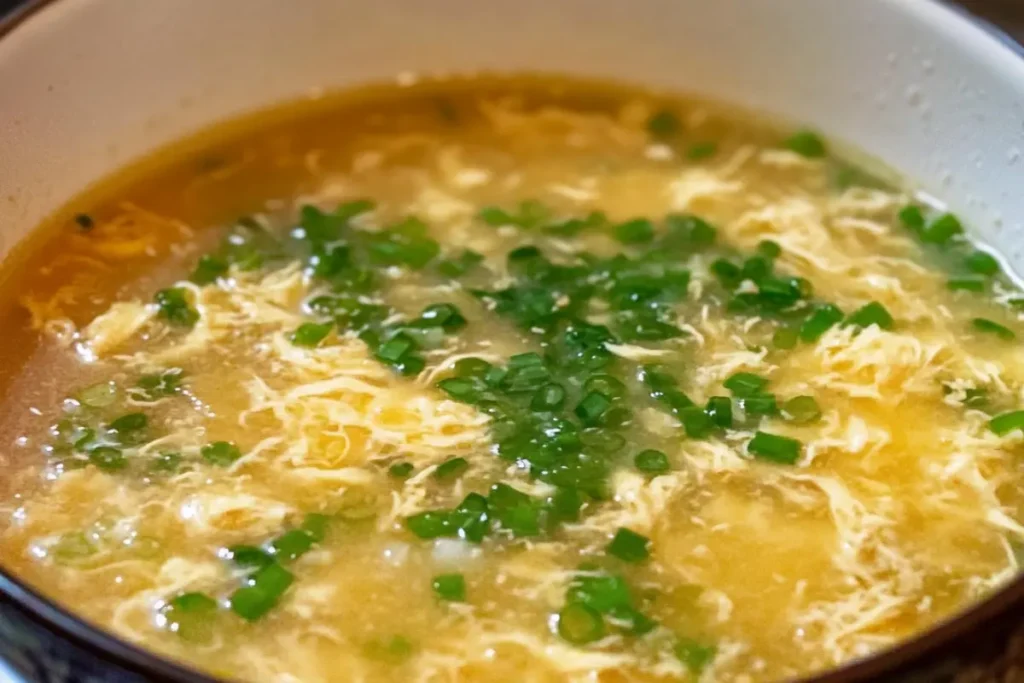Are you seeking a soup that is both comforting and incredibly nutritious? Then look no further than egg drop soup! This classic soup, known for its delicate strands of egg in a flavorful broth, is not only a delight to eat but also offers a surprising array of nutritional benefits. Understanding egg drop soup nutrition can help you appreciate this light yet satisfying dish even more. This article will delve into the nutritional profile of egg drop soup, exploring its health advantages and why it’s a fantastic choice for a balanced diet.
Table of Contents
Delving into Egg Drop Soup Nutrition: More Than Just Comfort Food
Egg drop soup, a staple in Chinese-American cuisine, is often perceived simply as a comforting and light appetizer. However, a closer look at egg drop soup nutrition reveals that it offers much more than just a pleasant taste. Therefore, it’s time to re-evaluate egg drop soup beyond its comforting reputation and recognize its nutritional value.
The soup’s primary ingredients – eggs and broth – are inherently nutritious. Eggs are a powerhouse of protein and essential nutrients, while broth, especially homemade, can be rich in minerals and collagen. Furthermore, the simplicity of egg drop soup allows for healthy customization. You can enhance its nutritional value by adding vegetables, lean proteins, and whole grains. Understanding egg drop soup nutrition empowers you to make informed choices and enjoy this soup as part of a healthy eating plan. Therefore, egg drop soup deserves recognition not only as a comforting dish but also as a nourishing and versatile culinary option.
Why Egg Drop Soup Nutrition Makes it a Healthy Choice
There are compelling reasons why egg drop soup nutrition makes it a healthy and beneficial addition to your diet. Firstly, it is low in calories. A typical serving of egg drop soup is relatively low in calories, making it suitable for weight management. Secondly, it’s a good source of protein. Eggs are a complete protein, providing all nine essential amino acids. Thirdly, egg drop soup can be packed with vitamins and minerals. Depending on the broth and added ingredients, it can offer vitamins A, D, E, and B vitamins, as well as iron and selenium.
Moreover, egg drop soup nutrition often includes hydrating properties. The broth base helps contribute to your daily fluid intake. Furthermore, it is easily digestible. The light and simple nature of egg drop soup makes it gentle on the digestive system, ideal for those with sensitive stomachs. Finally, it is easily customizable for dietary needs. You can adjust ingredients to make it gluten-free, low-sodium, or vegetarian. Therefore, considering egg drop soup nutrition, it stands out as a healthy, versatile, and easily adaptable soup option.
Breaking Down Egg Drop Soup Nutrition Facts: Key Components
To fully appreciate egg drop soup nutrition, let’s examine the key nutritional components typically found in a standard serving:
- Calories: Generally low, ranging from approximately 60-100 calories per cup. This makes it a light and guilt-free choice.
- Protein: Provides a moderate amount of protein, typically around 4-6 grams per cup. This protein comes primarily from the egg.
- Fat: Low in fat, usually around 3-7 grams per cup. The fat content can vary based on the type of broth and any added oils.
- Carbohydrates: Very low in carbohydrates, typically around 2-5 grams per cup. These carbohydrates mainly come from added vegetables or thickening agents like cornstarch.
- Sodium: Sodium content can vary widely depending on the broth used. Restaurant versions and those made with high-sodium broths can be high in sodium. Homemade versions using low-sodium broth can be significantly lower. It’s important to be mindful of sodium when considering egg drop soup nutrition.
- Vitamins and Minerals:Egg drop soup nutrition includes several important micronutrients, though amounts vary.
- Vitamin A: Present in eggs and carrots (if added), important for vision and immune function.
- Riboflavin (Vitamin B2): Found in eggs, essential for energy production.
- Selenium: Eggs are a good source of selenium, an antioxidant mineral.
- Iron: Eggs contribute a small amount of iron, important for red blood cell production.
- Potassium: Broth and vegetables can contribute potassium, important for heart health.
- Cholesterol: Eggs do contain cholesterol. However, dietary cholesterol’s impact on blood cholesterol is now understood to be less significant for most people than previously thought. For those with specific cholesterol concerns, moderation is always advisable when considering egg drop soup nutrition.
Understanding these egg drop soup nutrition facts helps you see how this soup can fit into a healthy eating pattern. Its low calorie count and moderate protein content, along with potential vitamins and minerals, make it a valuable and nutritious choice.

Maximizing Egg Drop Soup Nutrition: Healthy Ingredients and Preparation
To truly maximize the nutritional benefits of egg drop soup, focusing on healthy ingredients and preparation methods is key. Here are some ways to boost egg drop soup nutrition:
- Choose Low-Sodium Broth: Opt for low-sodium chicken broth, vegetable broth, or homemade broth to significantly reduce the sodium content. High sodium levels can negate some of the health benefits of egg drop soup nutrition.
- Increase Vegetable Content: Add nutrient-rich vegetables to your egg drop soup. Good options include:
- Spinach: Packed with vitamins A, C, and K, as well as iron.
- Mushrooms: Low in calories and fat, good source of B vitamins and selenium.
- Carrots: Rich in beta-carotene, which the body converts to vitamin A.
- Green Onions: Add flavor and a source of vitamin K and vitamin C.
- Bok Choy: Provides vitamins A and C, as well as calcium.
- Use Whole Eggs: Use whole eggs instead of just egg whites to get the full range of nutrients, including healthy fats and fat-soluble vitamins found in the yolk. Egg drop soup nutrition is enhanced by using the whole egg.
- Add Lean Protein (Optional): For a more substantial and protein-rich soup, consider adding small amounts of lean protein:
- Shredded Chicken Breast: Provides lean protein without adding much fat.
- Tofu Cubes: A plant-based protein source that is low in calories and fat.
- Shrimp: Quick-cooking and adds protein and flavor.
- Limit Added Salt and Unhealthy Fats: Be mindful of added salt, especially if using store-bought broth. Avoid adding excessive amounts of oil or high-fat ingredients. Keeping added fats minimal is crucial for maintaining optimal egg drop soup nutrition.
- Incorporate Healthy Seasonings: Enhance flavor with healthy seasonings instead of relying heavily on salt. Good options include:
- Ginger: Anti-inflammatory properties and adds warmth.
- Garlic: Immune-boosting properties and rich flavor.
- White Pepper: Adds a subtle heat without sodium.
- Turmeric: Anti-inflammatory and antioxidant benefits, adds color and mild flavor.
- Consider Whole Grain Noodles (Optional): For a heartier soup, add a small portion of whole grain noodles or glass noodles for added fiber and complex carbohydrates. This can further improve egg drop soup nutrition.
By implementing these strategies, you can significantly enhance the nutritional profile of your egg drop soup and make it an even healthier and more satisfying meal option. Prioritizing whole, unprocessed ingredients is key to maximizing egg drop soup nutrition.
Egg Drop Soup Nutrition and Weight Management: A Slimming Soup?
Egg drop soup can be a valuable tool for weight management due to its favorable nutritional profile. Its low calorie density and moderate protein content contribute to its potential role in a weight-conscious diet. Let’s explore how egg drop soup nutrition supports weight management:
- Low in Calories: As mentioned, egg drop soup is naturally low in calories. This allows you to enjoy a satisfying bowl without significantly impacting your daily calorie intake. This is a cornerstone of egg drop soup nutrition for weight management.
- Moderate Protein: The protein from eggs helps promote satiety, keeping you feeling fuller for longer after eating. Protein is crucial for weight management as it helps preserve lean muscle mass while dieting. The protein component of egg drop soup nutrition is beneficial for appetite control.
- High Water Content: The broth base of egg drop soup is primarily water, which adds volume to the meal without adding calories. High-water content foods can contribute to feelings of fullness and hydration. The hydrating aspect of egg drop soup nutrition can aid in weight management.
- Versatile and Customizable: You can easily customize egg drop soup to further align with weight management goals. Adding more vegetables increases fiber and nutrient content while keeping calories low. Using lean protein sources enhances satiety. The flexibility of egg drop soup nutrition makes it ideal for tailored weight management plans.
- Satisfying and Comforting: Despite being low in calories, egg drop soup is warm, comforting, and flavorful. This can help satisfy cravings for richer, higher-calorie foods, making it easier to stick to a weight-loss diet. The comforting nature of egg drop soup nutrition can support adherence to dietary changes.
- Easy to Incorporate: Egg drop soup is quick and easy to prepare, making it a convenient option for busy individuals trying to manage their weight. Its ease of preparation enhances the practicality of egg drop soup nutrition for daily consumption.
However, it’s important to remember that while egg drop soup nutrition is beneficial for weight management, it’s not a magic bullet. Sustainable weight loss is achieved through a balanced diet, regular exercise, and healthy lifestyle habits. Egg drop soup can be a valuable part of a comprehensive weight management strategy, thanks to its nutritional attributes. It’s a supportive element within a broader approach to healthy living.
Navigating Sodium in Egg Drop Soup Nutrition: Tips for a Lower Sodium Version
One potential concern regarding egg drop soup nutrition is its sodium content. Many restaurant versions and recipes using standard broths can be high in sodium. Excessive sodium intake can be detrimental to health, especially for individuals with high blood pressure or heart conditions. However, it’s entirely possible to enjoy egg drop soup nutrition while keeping sodium levels in check. Here are practical tips for reducing sodium in your egg drop soup:
- Start with Low-Sodium Broth: This is the most crucial step. Always choose low-sodium or no-salt-added chicken broth or vegetable broth as the base of your soup. This immediately reduces the sodium load in egg drop soup nutrition.
- Make Homemade Broth: Even better than store-bought low-sodium broth is homemade broth. You have complete control over the sodium content when you make your own broth from scratch. Homemade broth significantly improves egg drop soup nutrition in terms of sodium control.
- Limit Soy Sauce or Salt: Be mindful of added soy sauce or salt. Taste the soup before adding any extra salt and add sparingly if needed. Consider using low-sodium soy sauce if you choose to add it. Reducing added salt is key to lower sodium egg drop soup nutrition.
- Enhance Flavor with Sodium-Free Seasonings: Utilize sodium-free seasonings to boost flavor without adding salt. Ginger, garlic, white pepper, turmeric, and herbs like cilantro and green onions are excellent options. Flavor enhancement through spices is a cornerstone of healthy egg drop soup nutrition.
- Increase Vegetables: Adding more vegetables not only increases the vitamin and mineral content but can also dilute the sodium concentration in the soup overall. Vegetables contribute positively to overall egg drop soup nutrition.
- Avoid Processed Ingredients: Steer clear of processed ingredients that can be hidden sources of sodium. Focus on whole, fresh ingredients for optimal egg drop soup nutrition and sodium management.
- Taste and Adjust: Always taste your soup before serving and adjust seasonings accordingly. Train your palate to appreciate flavors beyond saltiness. Mindful tasting is crucial for balanced and healthy egg drop soup nutrition.
By implementing these sodium-conscious strategies, you can enjoy the comforting and nutritious qualities of egg drop soup without excessive sodium intake. Making informed choices about ingredients and preparation empowers you to optimize egg drop soup nutrition for your health needs.
Egg Drop Soup Nutrition for Specific Dietary Needs: Adaptations and Considerations
Egg drop soup is remarkably adaptable, making it suitable for various dietary needs and preferences. Understanding how to modify the recipe allows you to enjoy egg drop soup nutrition even with dietary restrictions. Here’s how to adapt egg drop soup for specific needs:
- Gluten-Free Egg Drop Soup Nutrition:
- Broth: Ensure your broth is certified gluten-free. Most plain chicken and vegetable broths are naturally gluten-free, but always check labels to be certain.
- Thickening Agent: Instead of cornstarch (which is generally gluten-free but may be a concern for some with sensitivities), use tapioca starch or arrowroot starch as gluten-free thickening options.
- Soy Sauce: Use tamari, a gluten-free soy sauce alternative. Coconut aminos are another gluten-free and soy-free option for umami flavor, though they are sweeter.
- Noodles (Optional): If adding noodles, choose gluten-free options like rice noodles or glass noodles.
- Vegetarian Egg Drop Soup Nutrition:
- Broth: Use vegetable broth as the base. Ensure it’s flavorful to compensate for the absence of chicken broth.
- Protein Boost: Add extra tofu or consider using vegetarian “chicken” broth for a richer flavor.
- Seaweed: Adding a small amount of dried seaweed like wakame can enhance the umami flavor and nutritional value of vegetarian egg drop soup nutrition.
- Low-Carb/Keto Egg Drop Soup Nutrition:
- Omit Cornstarch: Skip the cornstarch or any other thickening agent to minimize carbohydrates. The egg itself will slightly thicken the soup.
- Increase Fat (Optional): For keto diets, you can increase healthy fats by adding a drizzle of sesame oil or coconut oil, or incorporating avocado as a garnish.
- Focus on Protein and Vegetables: Emphasize protein from eggs and add low-carb vegetables like spinach, mushrooms, and bok choy to maintain a low-carb profile in egg drop soup nutrition.
- Low-FODMAP Egg Drop Soup Nutrition:
- Broth: Use homemade low-FODMAP broth or carefully select store-bought low-FODMAP broth. Avoid broths with onion or garlic if these are triggers.
- Aromatics: Use garlic-infused oil for garlic flavor instead of actual garlic pieces. Use the green parts of scallions instead of the white bulbs. Ginger is generally low-FODMAP.
- Vegetables: Choose low-FODMAP vegetables like spinach, carrots, and bok choy in moderation. Avoid high-FODMAP vegetables like onions, garlic, and mushrooms if they are triggers.
By making these thoughtful substitutions and adjustments, you can tailor egg drop soup nutrition to align perfectly with your specific dietary needs and preferences. Its inherent flexibility is a major advantage for diverse dietary patterns.

FAQ
Q: Is egg drop soup healthy?
A: Yes, egg drop soup can be a very healthy choice. It is low in calories, provides moderate protein, and can be a good source of vitamins and minerals, especially when made with low-sodium broth and added vegetables. Egg drop soup nutrition is generally quite favorable.
Q: How many calories are in egg drop soup?
A: A typical cup of egg drop soup contains approximately 60-100 calories. The exact calorie count can vary slightly depending on the recipe and serving size. The low calorie count is a key aspect of egg drop soup nutrition.
Q: Is egg drop soup good for weight loss?
A: Yes, egg drop soup can be a beneficial food for weight loss. It is low in calories and fat, yet provides protein to help you feel full and satisfied. Its high water content also contributes to satiety. Egg drop soup nutrition supports weight management goals.
Q: What are the nutritional benefits of egg drop soup?
A: Egg drop soup provides protein, vitamins (like A, B2, and potentially D, E, K depending on ingredients), and minerals (like selenium, iron, and potassium). It is also hydrating and easily digestible. The comprehensive egg drop soup nutrition profile offers various health advantages.
Q: Is egg drop soup high in sodium?
A: Egg drop soup can be high in sodium, especially restaurant versions or those made with regular broth and soy sauce. However, homemade versions using low-sodium broth and mindful seasoning can be significantly lower in sodium. Sodium content in egg drop soup nutrition is controllable with careful preparation.
Q: Can I make vegetarian or vegan egg drop soup?
A: Vegetarian egg drop soup is easily achievable using vegetable broth. A truly vegan version is more challenging as the egg is a key component. However, you can make a “vegan egg drop soup inspired” dish using silken tofu or plant-based egg substitutes for texture, though the egg drop soup nutrition profile will be different.
Q: What are some healthy additions to egg drop soup?
A: Healthy additions to boost egg drop soup nutrition include spinach, mushrooms, carrots, green onions, bok choy, shredded chicken breast, tofu, and healthy seasonings like ginger and garlic.
Conclusion: Embrace the Health and Flavor of Egg Drop Soup Nutrition
Egg drop soup is far more than just a simple, comforting soup. A deep dive into egg drop soup nutrition reveals its significant health benefits and versatility. From its low calorie count and moderate protein content to its potential to be packed with vitamins and minerals, egg drop soup is a nutritional winner. This unassuming soup can be a valuable asset in weight management, a source of essential nutrients, and a comforting, easily digestible meal for various dietary needs.
By understanding egg drop soup nutrition and making informed choices about ingredients and preparation, you can fully unlock its health potential. Whether you’re seeking a light lunch, a nourishing appetizer, or a comforting dinner, egg drop soup is a delicious and healthy option that deserves a regular place in your culinary repertoire. Embrace the simplicity, customize it to your liking, and savor every spoonful of this surprisingly nutritious and delightful soup! Enjoy the wonderful combination of flavor and egg drop soup nutrition!

